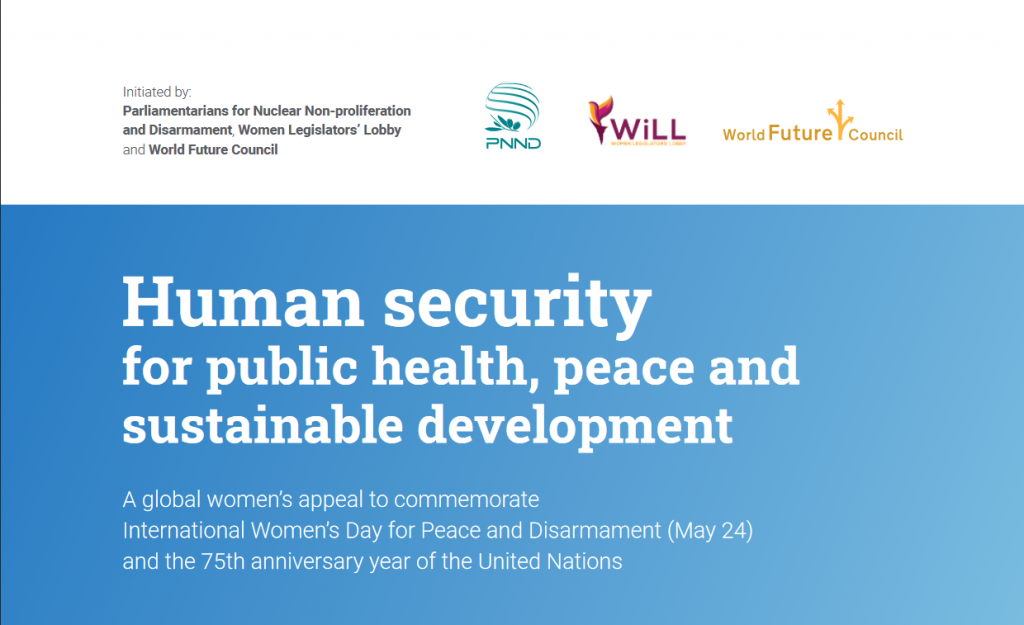237 women leaders endorse appeal for human security for public health, peace and sustainable development

Originally published here
Read the full appeal and list of endorsers here
On the occasion of International Women’s Day for Peace and Disarmament (May 24, 2020) we express our deep concern about the humanitarian and economic impact of the COVID-19 pandemic, the aggravating impact of conflict and armed violence, and the existential threats to humanity and the environment from climate change and nuclear weapons.
As women legislators, religious leaders and civil society representatives from around the world we call on governments and policy makers to transcend national borders, differing political persuasions and diverse religious beliefs in order to advance humanity’s common interest for peace, public health, disarmament sustainable development and ecological responsibility.
We affirm the vital role of women in peacemaking, policy development and governance. The COVID-19 pandemic demonstrates the importance of women as heads of state, parliamentarians, policy-makers, physicians, scientists, health care workers, and caregivers for children and aged persons. UN Security Council Resolution 1325 highlights the value women can also contribute as active participants of peace and disarmament processes.
The Coronavirus pandemic has undeniably demonstrated that key issues of human security cannot be resolved through military means or independently by nations, but require global cooperation and nonviolent conflict resolution. We highlight the importance of the United Nations, and its agencies like the World Health Organisation and United Nations Environment Program, for building such cooperation, managing global issues and advancing human security.
The global military budget of $1,900 billion ($100 billion alone on nuclear weapons) should be substantially cut in order to better fund the UN (current budget of $6 billion) and support climate protection, public health, resilient economies and the Sustainable Development Goals. The UN and WHO should consider establishing an improved process for transparency and information sharing, and for facilitating international cooperation and national management of future pandemics. This process should be developed in consultation with governments, experts and civil society.
We welcome Securing our Common Future, the Disarmament Agenda launched by United Nations Secretary-General (UNSG) Antonio Guterres on International Women’s Day for Peace and Disarmament in 2018, which outlines the importance of disarmament for the achievement of sustainable development, and of engaging all constituencies in disarmament action, especially women and youth.
And we call for warring parties around the world to agree to the UNSG’s appeal of March 2020 for a global ceasefire to help combat the Coronavirus pandemic. Such a ceasefire should continue even as we emerge from the current pandemic, and should be accompanied with significant cuts in the production and trade of conventional weapons and small arms, with the goal of achieving sustainable world peace and reducing violence.
Whether we are from Russia or USA, India or Pakistan, North Korea or South Korea, Iran or Israel, East or West, North or South, we share one planet and a common future. It is vital that we use diplomacy, conflict resolution, cooperation, common security and law to address security issues, rather than the threat or use of armed force or punitive sanctions.
The United Nations was established with an array of mechanisms through which nations can resolve conflicts, negotiate disarmament and address humanitarian issues and achieve security through diplomacy not war. We urge all governments to make better use of these mechanisms, including to accept the compulsory jurisdiction of the International Court of Justice for international conflicts (74 countries have already done so), and to replace nuclear deterrence and provocative arms races with reliance on common security.
The very first resolution of the United Nations called for the elimination of “nuclear weapons and all other weapons adaptable to mass destruction.” Yet, 75 years later, over 14,000 nuclear weapons remain in the world’s arsenals, threatening current and future generations and costing $100 billion annually to modernize and maintain. These weapons must be abolished and the funds for their development and deployment transferred to meet the needs of genuine human security.
We act as leaders in our local communities and countries to address these human security needs. But, as women, we also recognize our shared humanity globally, and the need to collaborate on building a peaceful, secure, sustainable, more respectful and just world.
The world became more united to combat the Coronavirus pandemic. Let us build on that unity, and be torchbearers for a better world embracing human security for our common future.



